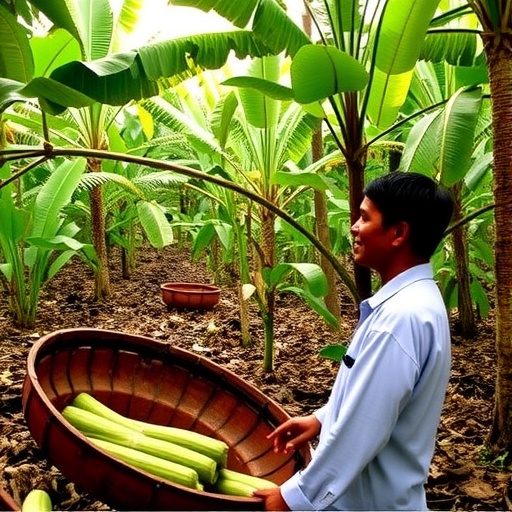In a groundbreaking examination of environmental change and agricultural practices, researchers have shifted their focus from the beloved cocoa crop to the more controversial palm oil industry. Identified as a pivotal element in Indonesia’s agricultural landscape, cocoa plantations have typically thrived in the nation’s moist, tropical climates. However, recent analyses indicate a paradigm shift in land use that could drastically alter both the ecological and economic landscapes of the region for generations to come.
The changing dynamics in Indonesia’s cocoa production are heralded by the rapid rise of palm oil as a more profitable agricultural commodity. Given its versatility and global demand, palm oil has systematically replaced cocoa in numerous plantations across the archipelago. This shift is being further encouraged by changing consumer behaviors and agricultural policies that prioritize short-term economic gain over long-term sustainability.
Against the backdrop of this agricultural transformation, researchers like Dröge and his collaborators are pouring over quantitative and qualitative data. Their work scrutinizes the environmental repercussions of converting cocoa farms into palm oil plantations, where issues such as deforestation, biodiversity loss, and greenhouse gas emissions come to the forefront. By assembling comprehensive studies that lay out the costs of this transition, they aim to provide policymakers with actionable insights necessary for fostering sustainable agricultural systems.
The research prominently highlights the potential for biodiversity loss on the heavily deforested islands. While cocoa plantations can support a diverse range of flora and fauna, palm oil monocultures offer a stark contrast, often leading to ecological imbalances. The researchers stressed that this biodiversity is crucial not only for environmental health but also for maintaining the socio-economic fabric of local communities reliant on various crops for their livelihoods.
Moreover, the socio-economic implications of this agricultural shift cannot be underestimated. Cocoa has traditionally been a cash crop that supports numerous families across Indonesia. The rise of palm oil presents not just an alternative crop for farmers, but it also introduces a host of challenges, including labor issues, land rights disputes, and market dependency. Scientists are evaluating how these socio-economic complexities interact with environmental factors, ultimately weaving a complex tapestry that showcases the interconnectedness of industry and sustainability.
To exemplify the economic allure of palm oil, the researchers presented a series of case studies that depict the rapid income growth experienced by farmers who transitioned from cocoa to palm oil. This profitability, though immediate, raises questions about the long-term repercussions of monoculture practices that often exploit labor and deplete land fertility. The study’s findings reveal that while the immediate financial benefits are tempting, the long-term outcomes may not be favorable for either the environment or the local populace.
The researchers recommend an integrated approach that includes agroforestry as a viable alternative. By interspersing palm oil with other crops, including cocoa, they argue that farmers can create more resilient agricultural systems that sustain both economic viability and ecological health. The notion of “sustainable intensification” emerges, hinting that farmers may not have to sacrifice biodiversity for profitability.
As these discussions persist, the research team is calling for widespread awareness concerning consumer choices. They emphasize that while the demand for palm oil continues to escalate, understanding the environmental consequences associated with its production can empower consumers to make informed choices that reflect their values.
Furthermore, the research team is actively working on developing policy frameworks that champion sustainable practices. This includes pushing for regulations that promote sustainable palm oil certification and incentivize cocoa farming practices that prioritize ecological integrity. The hope is to usher in a new era in which agricultural systems harmonize economic and ecological considerations, thereby fostering a flourishing environment for future generations.
Public response to these findings has been varied but enthusiastic. Environmental advocates are leveraging this research to push for better practices and policies in Indonesia, while cocoa producers are equally concerned about their future in a rapidly changing market. The ripple effects of these findings may encourage global conversations around sustainable development and responsible consumption in agriculture.
In summation, the future of Indonesia’s cocoa plantations stands at a crossroads, caught between the allure of quick profits and the imperative of environmental stewardship. The research represents not just a call to action for policymakers and farmers but also a clarion call for consumers worldwide to recognize their role in shaping agricultural practices through conscientious choices.
Collectively, this body of work underscores the need for an urgent discourse surrounding agricultural transitions in Indonesia. Researchers and practitioners alike must grapple with the complex layers of economic viability, ecological health, and social justice to achieve a more sustainable future for the agricultural sector. The stakes are high, and only through collaborative efforts can a balance between profit and planet be struck successfully.
Subject of Research: Agricultural transformation in Indonesia focusing on the shift from cocoa to palm oil.
Article Title: Correction: From chocolate to palm oil: The future of Indonesia’s cocoa plantations.
Article References:
Dröge, S., Bemelmans, J., Depoorter, C. et al. Correction: From chocolate to palm oil: The future of Indonesia’s cocoa plantations. Ambio 54, 2203–2206 (2025). https://doi.org/10.1007/s13280-025-02268-9
Image Credits: AI Generated
DOI:
Keywords: Cocoa, Palm Oil, Indonesia, Sustainability, Agriculture, Biodiversity, Economic Development, Climate Change, Deforestation, Agroforestry, Consumer Choices, Policy Frameworks, Environmental Impact, Socio-Economic Analysis.




